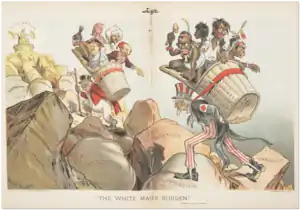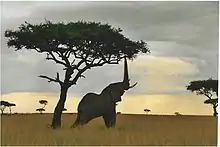Stereotypes of Africa
Stereotypes and generalizations about Africa, its inhabitants, and their culture have evolved in the Western world since the years of colonial settlement.[1][2] The idea of Africa's negative stereotypes come from historical and media interactions.[3][4][5][6][7] Many of the stereotypes of Africa originate from colonialism and media representation.[8][9]
Stereotypes by region and time
Europe

Belgians viewed Africans as childlike as in Tintin in the Congo.[10][11][12][13] The French tried to civilize the continent by colonizing it.[14] The Germans viewed themselves as the "master race" in comparison with Africans.[15][16] Some Italians stereotype Africans as illegal immigrants and beggars.[17] Polish understanding of Africa is informed by media, which tends to focus on negative or dramatic news from the continent.[18] Portuguese viewed ruling Africa as an act of charity.[19][20]
Charles Darwin helped promote the idea that some groups, such as Africans and Australian Aboriginals, were closer to non-human apes than Europeans were.[21][22][23][24]
Asia
China views itself as a benevolent helper of Africans.[25][26][27] In Chinese internet culture, unlucky or incompetent video game players are called 'Africans', a reference to the expression 'black face' to mean unluckiness.[28][29] Japan views Africa as a continent in need of help.[30][31][32][33][34] Some Africans in India are perceived negatively.[35][36] South Koreans view Africa as an undeveloped continent.[37]
United States
In the United States, Africa is viewed as disease-ridden and backward.[38][39][40][41][42][43][44][45][46]
Australia
Australians view Africans as part of criminal gangs.[47]
Common stereotypes
Environment

The common perception is that much or all of Africa is inhospitable jungle or desert,[48] or that it is mostly uninhabited savanna populated mainly by wild animals.[49]
Another mistaken belief about Africa is that wild animals are commonplace and are perceived the way domestic animals are in Western countries. While many large wild animals are in Africa, and they are well known at safaris (especially the lion, leopard, rhinoceros, elephant, and buffalo), many citizens of African countries typically do not see them outside of zoos.[50][51]
Poverty
Africa is often believed to be the epicenter of primitive culture and of poverty.[52][53][54][55][56] Some countries in Africa are impoverished, but many countries in Africa have thriving and prosperous economies, including South Africa, Nigeria, Kenya, Rwanda, and many others.[57]
Technology

Throughout the developed world, Africans are often perceived to have "no access to modern technology"; however, this is inaccurate.[50] A report in 2013 showed that 80 percent of Africans could access a mobile phone.[58][59] Internet usage across Africa grew by 20% in 2018, with penetration rates across North Africa of 59%, West Africa of 39%, Southern Africa of 51% and East Africa of 45%.[60]
Many people falsely believe that Africans live in "mud house[s] in the middle of nowhere."[50] Urban areas in Africa account for 43% of the continent's population,[61] though this is below the global average of 55 percent.[62]
Another common stereotype is that Africans commit online fraud.[63][64] The most well-known African scam is the advance-fee scam.[65]
Unity
Africa is often mistaken for a single country instead of a continent with 54 independent countries, each of which has its own languages, cultures, traditions, and histories.[49][66][67] This misrepresentation leads people to think that all Africans are the same and are without a unique history and culture.
Similarly, outsiders may believe that there is one language in Africa, called "African"; in fact, over 2,000 distinct languages are spoken throughout the African continent.[50] The most common language used on the African continent is Swahili.[68]
References
- Grinker, Roy Richard; Lubkemann, Stephen C.; Steiner, Christopher (17 May 2010). Perspectives on Africa: A Reader in Culture, History and Representation. John Wiley & Sons. p. 98. ISBN 9781444335224. Retrieved 16 May 2017 – via Google Books.
- Tamale, Sylvia (23 June 2011). African Sexualities: A Reader. Fahamu/Pambazuka. ISBN 9780857490162. Retrieved 16 May 2017 – via Google Books.
- "Afrophobia: Europe should confront this legacy of colonialism and the slave trade". Commissioner for Human Rights. Retrieved 4 March 2019.
- Amy Clarke (June 2012). "People of African Descent in Europe : A UKREN Briefing Paper" (PDF). Ukren.org. Retrieved 4 March 2019.
- Jr, Henry Louis Gates (4 February 2017). "Opinion - The History the Slaveholders Wanted Us to Forget". Nytimes.com. Retrieved 4 March 2019.
- "Invisible Visible Minority" (PDF). Kisa.org. Retrieved 4 March 2019.
- Abbattista, Guido. "European Encounters in the Age of Expansion European Encounters". Ieg-ego.eu. Retrieved 4 March 2019.
- Olusoga, David (8 September 2015). "The roots of European racism lie in the slave trade, colonialism – and Edward Long - David Olusoga". Theguardian.com. Retrieved 4 March 2019.
- "Africa Stereotypes in the European media". En.ejo.ch. 25 July 2013. Retrieved 4 March 2019.
- "Tintin 90 years on: Belgian comic book stirs racial controversy". www.aljazeera.com. Retrieved 4 March 2019.
- Waterfield, Bruno (7 August 2007). "Tintin book accused of colonial racism". Telegraph.co.uk. Retrieved 5 March 2019.
- Bambi Ceuppens. "Remembering and Forgetting the Belgian Colonial Past" (PDF). Kuleuven.be. Retrieved 5 March 2019.
- Heidenrich, John G. (5 March 2019). How to Prevent Genocide: A Guide for Policymakers, Scholars, and the Concerned Citizen. Greenwood Publishing Group. ISBN 9780275969875. Retrieved 5 March 2019 – via Google Books.
- "Are we finally realising that Macron isn't that liberal after all?". The Independent. 11 July 2017. Retrieved 4 March 2019.
- Anton Scholz (July 2015). "Hutu, Tutsi, and the Germans : Racial Cognition in Rwanda under German Colonial Rule" (PDF). Openaccess.leidenuniv.nl. Leiden University. Retrieved 5 March 2019.
- "The image of Africa in Germany is often marked by stereotype". D+C. Retrieved 12 April 2019.
- Rossella Falanga; Maria Elvira De Carolia; Elisabetta Sagone. "WCPCG 2013 : The relationship between stereotypes and prejudice toward the Africans in Italian university students" (PDF). Fmag.uniict.it. Retrieved 2017-05-23.
- Ndiayea, Iwona Anna; Ndiayea, Bara (2014). "Sociocultural Stereotypes in Media and Intercultural Communication (Africa in the Polish Media)". Procedia - Social and Behavioral Sciences. 154: 72–76. doi:10.1016/j.sbspro.2014.10.114.
- Kuper, Hilda (5 March 1964). "The Colonial Situation in Southern Africa". The Journal of Modern African Studies. 2 (2): 149–164. doi:10.1017/S0022278X00003979. JSTOR 158816.
- Henriques, Joana Gorjão (12 September 2011). "Portugal is race blind, but not for the right reasons - Joana Gorjão Henriques". Retrieved 5 March 2019 – via www.theguardian.com.
- "Did Charles Darwin believe in racial inequality?". The Independent. 30 January 2009. Retrieved 5 March 2019.
- "The Representation of Africa in Western Media: still a 21st century problem". ResearchGate. Retrieved 5 March 2019.
- Mills, Charles W.; Hund, Wulf D. "Comparing black people to monkeys has a long, dark simian history". The Conversation. Retrieved 5 March 2019.
- Cerasano, S. P. (1 August 2007). Medieval and Renaissance Drama in England. Fairleigh Dickinson Univ Press. ISBN 9780838641279. Retrieved 14 March 2019 – via Google Books.
- Brown, Warner. "Map: China's Stereotypes of Africa, from 'Chaotic' Somalia to 'Awesome' Gambia". Foreignpolicy.com. Retrieved 4 March 2019.
- Madrid-Morales, Dani. "China's media struggles to overcome stereotypes of Africa". The Conversation. Retrieved 4 March 2019.
- Madrid-Morales, Dani; Madrid-Morales, Dani. "China's media is struggling to overcome its racial stereotypes of Africa". Quartz Africa. Retrieved 4 March 2019.
- "In China's gaming world, 'Europeans' and 'Africans' expose stereotypes". South China Morning Post. 29 May 2018. Retrieved 4 March 2019.
- "In China's gaming world, lucky 'Europeans' and unlucky 'Africans' expose racial stereotypes". sg.news.yahoo.com. Retrieved 4 March 2019.
- Makoto Sato. "Japanese Aid Diplomacy in Africa : An Historical Analysis" (PDF). Pdfs.semanticscholar.org. S2CID 33086945. Retrieved 4 March 2019.
- Capobianco, Paul (1 June 2015). "Confronting diversity: Africans challenging Japanese societal convictions". Contemporary Japan. 27 (2): 189–212. doi:10.1515/cj-2015-0011.
- Lumumba-Kasongo, T. (26 April 2010). Japan-Africa Relations. Springer. ISBN 9780230108486. Retrieved 4 March 2019 – via Google Books.
- Engel, Ulf; Olsen, Gorm Rye (10 November 2004). Africa and the North: Between Globalization and Marginalization. Routledge. ISBN 9781134315888. Retrieved 4 March 2019 – via Google Books.
- T. Lumumba-Kasongo. Japan-Africa Relations (PDF). Palgrave Macmillan. ISBN 9780230108486. Retrieved 4 March 2019.
- Prabhakar, Anu. "'There's more to us than black skin': The first Miss Africa India hopes to break racial stereotypes". Scroll.in. Retrieved 4 March 2019.
- Singh, Madhur (21 June 2010). "Why Do Black African Racial Stereotypes Persist in India?". Time. Retrieved 4 March 2019.
- "South Koreans Share Their Thoughts On Black People In Eye-Opening Video". HuffPost Canada. 15 February 2017. Retrieved 4 March 2019.
- "The Africa Stereotype". Nydailynews.com. Retrieved 16 May 2017.
- "Africa: Beyond the Stereotypes". Smithsonianmag.com. Retrieved 16 May 2017.
- "Ebola and the History and Politics of Pointing at Immigrants as Potential Disease Vectors". Washingtonpost.com. Retrieved 4 March 2019.
- "The Representation of Africa in Western Media: still a 21st century problem". Researchgate.net. Retrieved 4 March 2019.
- Manya, Sheba Anili (20 February 2017). "U.S. MASS MEDIA PORTRAYAL OF THE AFRICAN CONTINENT: THE AFRICAN PERSPECTIVE". Wtamu-ir.tdl.org. Retrieved 5 March 2019.
- "On Being an African in the US: Navigating an Endless Web of Stereotypes". VOA. Retrieved 5 March 2019.
- Foday Darboe (2006). "Africans and African Americans: Conflicts, Stereotypes and Grudges" (PDF). Core.ac.uk. Portland State University. Retrieved 5 March 2019.
- O'Rourke, Harmony S. (2009). "STEREOTYPES OF AFRICA IN THE UNITED STATES - Mistaking Africa: Curiosities and Inventions of the American Mind. By Curtis Keim. Second edition. Boulder, CO: Westview Press, 2009. Pp. xiii+234. £18.99/$32, paperback". The Journal of African History. 50 (3): 460–461. doi:10.1017/S0021853709990727. ISBN 978-0-8133-4386-0.
- Zimmerman, Jonathan (9 July 2014). "Americans Think Africa Is One Big Wild Animal Reserve". The New Republic. Retrieved 5 March 2019.
- "Stereotyping of Africans is everywhere, but Australians are particularly clueless". The Guardian. 7 March 2016. Retrieved 16 May 2017.
- Amy E. Harth. "Representations of Africa in the Western News Media: Reinforcing Myths and Stereotypes" (PDF). Pol.illinoisstate.edu. Retrieved 4 March 2019.
- "Americans Think Africa Is One Big Wild Animal Reserve". The New Republic. 2014-07-09. Retrieved 16 May 2017.
- Kelland, Zoe; Sanchez, Erica (12 January 2018). "15 Reasons African Countries Aren't 'Shitholes'". Global Citizen. Global Poverty Project. Retrieved 19 October 2018.
- "Beyond Wildlife: Teaching about Africa and Stereotypes". Socialstudies.org. 12 April 2016. Retrieved 16 May 2017.
- "Young Africans embrace Chinese gadgets, shatter stereotypes - Business". Chinadaily.com.cn. Retrieved 16 May 2017.
- "AFRICA BY THE AFRICANS: Young Tastemakers Aim to Challenge Stereotypes - EBONY". Ebony.com. 2016-07-22. Retrieved 16 May 2017.
- "Erasing stereotypes about Africa - New African Magazine". Newafricanmagazine.com. 13 January 2015. Retrieved 16 May 2017.
- "Dispelling stereotypes about Africans - Voices of Africa". Voicesofafrica.co.za. 3 February 2014. Retrieved 16 May 2017.
- "Fighting stereotypes with stories - Africa - DW.COM - 18.11.2016". Dw.com. Retrieved 16 May 2017.
- Bremmem, Nur (2014-12-18). "7 African countries with booming ecommerce markets. However, when comparing by GDP per capita, only Mauritius barely exceeds the world average of 11355 $, while among the poorest thirty nations, twentyfour are african". Venturebur.comn. Retrieved 16 October 2018.
- "African mobile penetration hits 80% (and is growing faster than anywhere else)". VentureBeat.com. 2013-12-03. Retrieved 2019-03-01.
- TA Telecom White Paper: Africa Telecom Market 2013 Report
- "Digital in 2018: Africa's internet users increase by 20%". Africanews.com. Retrieved 2018-11-07.
- "Urbanization in 2018, by continent". Statista.com. Retrieved 19 October 2018.
- Meredith, Sam (2018-05-17). "Two-thirds of global population will live in cities by 2050, UN says". Cnbc.com. Retrieved 2018-12-19.
- Jenna Burrell. "Problematic Empowerment: West African Internet Scams as Strategic Misrepresentation". Itidjournal.org. Retrieved 2 March 2019.
- "JILT 2009 (1) - Olowu". Warwick.ac.uk. Retrieved 2 March 2019.
- Mikkelson, David (17 August 2001). "FACT CHECK: Nigerian (419) Scam". Snopes.com. Retrieved 2019-03-01.
- Teo Kermeliotis. "'Africa is not a country': Campaign dispels stereotypes". Cnn.com. Retrieved 16 May 2017.
- "Why Africans worry about how Africa is portrayed in western media | Remi Adekoya | Opinion". The Guardian. Retrieved 2017-05-23.
- "Top 11 Most Spoken Languages in Africa". Africa Facts. 2017-10-18. Retrieved 2018-12-19.